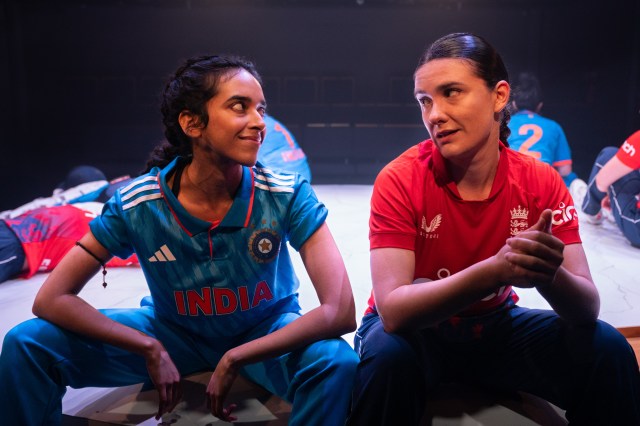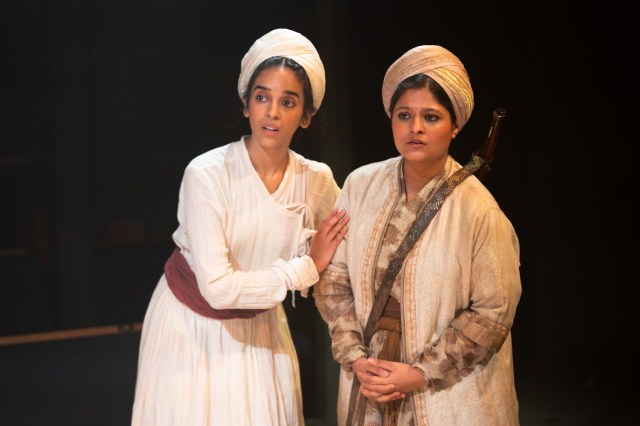Testmatch at the Orange Tree Theatre – review
Kate Attwell’s cricket-infused play runs until 18 May

Kate Attwell’s new-ish play, first seen in San Francisco in 2019, is an oddball, genuinely funny thing, refreshingly unusual, and accomplished in its fusion of rambunctious comedy, feminist tract and history lesson. Split into two acts, wildly contrasted on the surface but each informing the other to sometimes surprising effect, Testmatch often recalls Caryl Churchill at her most absurd and mould-breaking. If it isn’t entirely successful, it’s a fun and informative ride, but one that feels as though it needed another draft to become a fully satisfying play.
The first half sees members of the Indian and English women’s cricket teams spikily sharing the same space after rain stops play at a present-day World Cup tournament hosted in the UK. The Indian women bemoan the food and the weather (“if I had to live in this, I’d get off this island as fast as I could”) while the English team members bicker about sponsorships, ex-boyfriends and match fixes. The rivalry between the national teams is tremendously entertaining for the most part, and Attwell introduces the sobering theme of England’s shameful colonial history in India with real skill, sounding like the sort of conversations these bright, smart young women would actually have rather than just a series of hackneyed but impassioned viewpoints.
The writing is crisp and engaging, although a running joke where the horniest of the England team (a sparkling Mia Turner) repeatedly returns to her theme that rugby boys make better lovers than cricketers, feels belaboured. The team camaraderie, persistent niggles and irritations are beautifully managed in Diane Page’s production, as are some of the unconventional quirks of these young women (Bea Svistunenko’s English captain is a ball of pent-up rage for reasons that soon become clear, and Tanya Katyal’s delightfully gawky junior player supports a fellow team member’s gay sexuality but can’t quite allow herself to say the word “lesbian” out loud). Aiyana Bartlett is compellingly stoic as the Indian deputy captain who tempers her voice of reason with a pleasing fierceness. Elsewhere, the acting can seem a little over-emphatic in the Orange Tree’s intimate auditorium, but the sheer energy of the cast is disarming.

The second half delivers a volte-face so unexpected it takes a couple of minutes to adjust: suddenly we are in 18th-century Calcutta where a pair of old English colonial cricketers (Svistunenko again, and Haylie Jones) are practising their sport while patronising the hell out of their Indian housekeeper (Katyal), discussing trade agreements, and ensuring that the unruly wife of one of them is dosed up with enough opium to keep her quiet. The playing and presentation is deliberately over-the-top, with a Monty Python-esque sense of its own absurdity. This throws into relief the really serious point Attwell is making about the devastating consequences of colonialism, as outlined movingly by a visiting messenger (Aarushi Riya Ganju, excellent): “famine rushes like wave across this land, swallows it all…you have pillaged Bengal. And for what?”
Ganju aside, the go-for-broke performance style for much of the second act has a tendency to emphasise the outrage at the expense of the heartbreak at the core of the piece. So does the surfeit of information about the rules of the game, given that Testmatch is really only about cricket to the same extent that Dear England and Red Pitch were about football. Some of it is very interesting though, such as the fact that overarm bowling was introduced by women, tired of forever losing balls in their voluminous skirts (“we are now, quite literally, throwing like girls” observes one of the Wooster-ish male cricketers), and the subsequent historical erasure of this female contribution to the game.
Page’s staging has a terrific pace, although it sometimes seems a little cramped on Cat Fuller’s fractured raised disc of a set. The point that women can behave just as badly as men isn’t a new one but the powder keg atmosphere of competitive sport certainly puts a potent spin (pun intended) on it. Testmatch is an uneven piece but it’s thought-provoking and ambitious and feels fresh and original in this UK premiere.
















